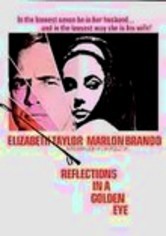Reflections in a Golden Eye-1967
Director John Huston
Starring Marlon Brando, Elizabeth Taylor
Scott’s Review #678
Reviewed September 3, 2017
Grade: A
Reflections in a Golden Eye is a film made during the beginning of a rich and creative time in cinema history (the latter part of the 1960s and the beginning part of the 1970s), where films were “created” rather than produced.
Less studio influence meant more creative control for the director- in this case, John Huston, who cast the immeasurable talents of Elizabeth Taylor and Marlon Brando in the key roles.
Worth mentioning is that Montgomery Clift was the intended star, but died before the shooting began. Richard Burton had turned the role down.
The film is an edgy and taboo story of lust, jealousy, and sexual repression set amid a southern military base. In the novel 1967, repressed homosexuality is explored in full detail, as well as heterosexual repression and voyeurism.
Originally a flop at the box office, the film has since become an admired and cherished part of film history.
Reflections in a Golden Eye is based on the classic 1941 novel, written by Carson McCullers.
Major Weldon Penderton (Brando) resides with his spoiled wife Leonora (Taylor) at a US Army post somewhere in the south during the 1940s and 1950s era.
A neighboring couple, Lieutenant Colonel Morris Langdon (Brian Keith) and his depressed wife, Alison (Julie Harris) are also featured and the trials and tribulations of Army life are exposed. Playing key roles are Langdon’s effeminate houseboy, Anacleto, and a mysterious Private Williams, played by a young and dashing Robert Forster.
Weldon is a repressed homosexual, rigid, and very unhappy with himself and his life, despite being successful professionally. To make matters worse, he is repeatedly needled and tormented by Leonora, who is having an affair with Morris.
Leonora adores her prized horse Firebird, who becomes a major part of the story. When Weldon and Leonora spy Private Williams completely naked in the woods riding bareback, Weldon feigns disgust, but his secret desires for the young man are revealed.
The two men then begin a secret cat-and-mouse game of spying and following each other around until a tragedy occurs.
Reflections in a Golden Eye is not a happy film, but rather a depressing piece of troubled lives and emotions. Passions are unfulfilled and repeatedly repressed as each character can be dissected in a complex fashion.
I am intrigued most of all by the character of Private Williams. A bit of an oddity, he mainly watches the action from afar learning Weldon and Leonora’s secrets- they keep separate bedrooms and repeatedly squabble.
We wonder- is Williams obsessed with Weldon or Leonora? Or both? He sneaks into her room and rummages through her lingerie and perfume drawers. Would he, in a different time, consider himself to become transgender? Or merely intrigued by cross-dressing?
Weldon can also be carefully examined- he has fits of rage and violence frequently erupts. Poor Firebird suffers a violent beating at his hands to say nothing of the main character’s fate at the end of the film. Having a macho and masculine exterior, his job is that of a leader, but the perception of a homosexual male during that time- if it was thought of at all was more like the femininity portrayed by the Filipino male, Anacleto.
Huston wisely casts both males well in this department as the men, along with Williams, could not be more different and nuanced.
A wise and telling aspect of the film is how it was originally shot with a muted yet distinguishable golden haze- appropriate to the film’s title- and much of the action seems to be viewed from the viewpoint of the horses.
The color theme was reportedly changed because it confused audiences, but my copy has the intended golden haze and I find this tremendous and works brilliantly with capturing Huston’s original intentions.
The film is reminiscent of Who’s Afraid of Virginia Woolf or Cat on a Hot Tin Roof, the former made only one year earlier. Arguably Taylor’s character in that film is very similar to Leonora.
In ways, Reflections of a Golden Eye (1967) could have been a stage production. One thing is clear- the film explores deeply the human psyche. I look forward to repeated viewings and further digging into the feelings and motivations of every principal character in a groundbreaking film by Huston.
